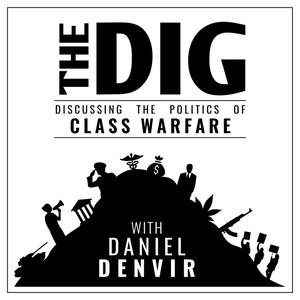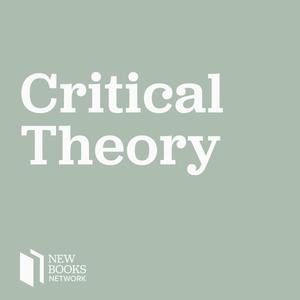
The Podcast for Social Research
The Brooklyn Institute for Social Research
- 1 hour 49 minutes(Pop) Cultural Marxism, Episode 13: Things of the Year 2024 — Part I
In episode 13 of (Pop) Cultural Marxism, Ajay and Isi ruminate on a largely dismal year in pop culture. Kicking off with a discussion of unexpected developments in the world of health insurance, the conversation turns to a number of broad trends that characterized culture this year: AI, long production cycles, platforms—rather than cultural works—as objects of cathexis, IP art, and the use of IP as trans-media anchors. Along the way, they discuss social bandits, collective effervescence, Leiji Matsumoto’s Interstella 5555: The 5tory of the 5ecret 5tar 5ystem, the Criterion Closet truck, Sony’s push into the television space, Jon Chu’s Wicked, and 2024’s revealing box office numbers. In the second half of the episode, Ajay and Isi discuss the year’s highlights (Metaphor: ReFantazio [GoTY], Elden Ring: Shadow of the Erdtree, Lies of P, Mati Diop’s Dahomey, Shuchi Talati’s Girls Will Be Girls, a performance of book 1 of The Odyssey by Joseph Medeiros, Edward Berger’s Conclave, Todd Phillip’s divisive Joker: Folie à Deux, the second season of AMC’s Interview with the Vampire, and True Detective: Night Country) and lowlights (Denis Villeneuve's Dune 2, Luca Guadagnino’s Challengers, and a whole lot of "just okay" television)—with more to come in a follow-up episode after the holidays!
31 December 2024, 5:10 pm - 1 hour 11 minutesPodcast for Social Research, Episode 84: Paradise Lost and Its Revolutionary Afterlives — Orlando Reade in Conversation
In episode 84 of the Podcast for Social Research, recorded live at BISR Central, BISR faculty Rebecca Ariel Porte and special guests Alla Della Subin and Katie Kadue sat down with fellow faculty Orlando Reade for a sweeping conversation to parallel the breadth of the study that occasioned it: Orlando’s acclaimed new book What In Me Is Dark, an exploration of the revolutionary political and poetic potential of Milton’s Paradise Lost by way of its most prominent and most various readers—from Thomas Jefferson to Malcolm X to 21st century students in a New Jersey prison. Topics touched on include: selective and disobedient reading (and the uses of each); divinity, abjection, and the poet’s body; creation and subjugation; paradise and self-determination; letting the bad ideas rip—in the 17th century and on Twitter—in order to strengthen the good ones; domesticating Milton; unresolved contradictions; the profane joy of bending a text to one’s present needs; and much else besides.
The Podcast for Social Research is produced by Ryan Lentini.
27 December 2024, 8:03 pm - 2 hours 9 minutesPractical Criticism No. 69 — 2024 Algorithmically "Wrapped"
In this episode we discussed our end-of-year Spotify Wrapped lists and what algorithmic listening means for us as subjects and social beings, mass culture's current expression in shared forms of circulation rather than in objects of attention held in common, the limits of poptimism, the sound of melancholy, experimental hip-hop, jazz, vocaloid(ish) bands, music as cinematic form, Sampa the Great, Ahmed Abdul-Malik, HoneyWorks, Weyes Blood, The Yeah Yeah Yeahs, and Arooj Aftab.
20 December 2024, 8:46 pm - 1 hour 10 minutesPodcast for Social Research, Episode 83: Big Bend in Concert
Episode 83 of the Podcast for Social Research features a live performance, at BISR Central, by chamber-pop outfit Big Bend, who played selections from their acclaimed third album Last Circle in a Showdown. After the performance, Big Bend vocalist, pianist, and songwriter Nathan Phillips sat down with BISR's Mark DeLucas for a conversation about musical origins and inspirations; Nathan's unique, communal approach to songwriting; musical improvisation vs. premeditation; whether albums still "matter"; making music with, or against, genre; and much else besides.
The performance begins at 00:32, and the conversation at 38:22.
13 December 2024, 4:10 pm - 1 hour 28 minutes(Pop) Cultural Marxism, Episode 12: Megalopolis — or, the Decline and Miraculous Resurrection of American Empire
In episode 12 of (Pop) Cultural Marxism, Ajay and Isi tackle Francis Ford Coppola’s Megalopolis (2024). Kicking off with a review of a few recent pop-cultural engagements—including an assemblage of classic vampire films (Coppola’s Bram Stoker’s Dracula (1992), among them), Mubi’s restoration of The Fall (2006), Elden Ring: Shadow of the Erdtree, and a pair of streaming series about professional wrestling—the conversation turns to Coppola’s reactionary would-be summa about an architect attempting to construct a techno-futuristic utopia on a plot of land in “New Rome,” an alternate-world New York City as played against Roman and early American history. Along the way, Ajay and Isi discuss Neri Oxman’s faux-ecological contributions to the film’s central animating macguffin, the mysterious “megalon;” the film’s antipathy for the marginalized masses; its protagonist as synthesis of Caesar, Robert Moses, Walter Gropius, and The Fountainhead’s Howard Roark; accidentally timely narratives of the “good guy” billionaire pitted against the “bad-guy” billionaire; and the ecofascist inclination to marry the romanticization of nature with authoritarian techno-optimism. Among the topics at hand are Coppola’s disturbing, “secretly autobiographical” efforts to reaffirm himself as auteur, his baffling postmodern pastiche, the classic right-wing themes of patriarchy as a sign of order and non-normative sexual expression as a sign of decline and decadence, the film’s shocking ugliness, and how Megalopolis’s strange incorporation of current events betrays “a baby boomer [having read] a bunch of airport history books.”
15 November 2024, 10:31 pm - 2 hours 25 minutesPodcast for Social Research, Episode 82: The Worst Laid Plans — Initial Reflections on the U.S. 2024 Election
In episode 82 of the Podcast for Social Research, Patrick Blanchfield and Ajay Singh Chaudhary take up the dismal U.S. election results, what brought us here, what comes next, and more. With the excellent Nara Roberta Silva and Isi Litke unfortunately both out sick but present in spirit and mind Patrick and Ajay reflect on how themes of depletion, exhaustion, and illness offer a perfect point of departure for processing the general morass of our moment’s florid pathologies and generally grim vibes. Their conversation proceeds by unpacking psychoanalytic theories of libidinal economy in terms of trauma response, repression, and “pathic projection” alongside a materialist interrogation of the structural, political-economic conditions of misery in a crumbling and violently flailing U.S. empire. How did the two campaigns appeal to the anxieties and antipathies of voters by ratifying or disavowing their feelings, and by offering them competing accounts of whom to blame? What is or isn't negotiable for the U.S. imperial project abroad and for social reproduction at home, and how does that relate to what is or isn't sayable, or even thinkable, in domestic US discourse? How should we understand “Trumpism” in relation not just to terminological debates over fascism, but in the context of global political trends? How does Trump’s brand of nativism, theocratic Christianity, and patriarchy mesh with longstanding features of the American project, where does it depart from them, and how does it resonate with other nationalisms abroad? And how do the Biden presidency, the Harris campaign, and initial responses from media and political figures demonstrate the increasing hegemony of such positions among elites? Against a backdrop of genocidal violence, mounting climate crisis, and ever-shrill chauvinism, this episode is the first in a series of confrontations with the starkly bleak conditions of current American politics.
8 November 2024, 6:59 pm - 52 minutes 55 secondsFaculty Spotlight: Bohemia Is An Imaginary City — Jude Webre on Dawn Powell, the Lady Wit, and the American Mid-Century
In this episode of Faculty Spotlight, hosts Mark DeLucas and Lauren K. Wolfe sit down with Jude Webre, cultural historian and practicing musician, to discuss the life and legacy of Dawn Powell, the urbane, acerbic, and woefully undercelebrated “lady wit” of Greenwich Village in its mid-century heyday. Attracted, as many of her generation were, by the allure of bohemia, its promise of liberation and self-realization, Powell exchanged her native midwest environs for an artist’s life in the city. Known, if not unremittingly beloved, by nearly all the literary lights of 1940s New York City—Edmund Wilson, Ernest Hemingway, Diana Trilling, Dorothy Parker, John Dos Passos, e.e. Cummings, and Jean Stafford to name just a few—it is hard to reconcile Powell’s social acumen, bracing wit, and the vitality of her literary output with the obscurity into which her life’s work has fallen in the six decades since her burial in a pauper’s grave. What were the manners, mores, and moods of mid-20th-century American bohemia? And how did Powell both share in and depart from them, both capture and censure them? What is it to follow a moral judgment and an aesthetic conviction, be they ever so slightly out of step with prevailing tastes? And what, finally, accounts for lasting literary fame?
The Podcast for Social Research is produced by Ryan Lentini.
25 October 2024, 6:27 pm - 36 minutes 58 secondsPodcast for Social Research, Episode 81.5: Romeo + Juliet — a Brief Film Guide
In this shortcast edition of the Podcast for Social Research, recorded live at BISR Central, BISR’s Rebecca Ariel Porte, Isi Litke, and Ajay Singh Chaudhary discuss Baz Luhrmann’s sensational 1996 film adaptation of Shakespeare’s Romeo and Juliet (or, in this case, Romeo + Juliet). Beginning with a brief literary and theatrical history of the play, Rebecca provides the conversation’s opening gambit: Shakespeare has never not been pop. The trio then, with a keen eye for detail, observes the many ways in which Luhrmann translates Shakespeare’s own pop-cultural tendencies into a medium and a style apropos of Venice Beach at the close of the millennium. Topics touched on include passions that threaten the social order, textual instability as adaptive possibility, intertextuality as production design strategy, teen drama as genre, teen-age as a time of emotional freedom, My So-Called Life, The O.C., Euphoria, spaghetti Westerns, police procedurals, Fredric Jameson on blank parody and endless pastiche, and much else besides.
The Podcast for Social Research is produced by Ryan Lentini.
26 September 2024, 9:05 pm - 1 hour 1 minutePodcast for Social Research, Episode 81: Medium Cool — or, "Jesus, I Love to Shoot Film"
Episode 81 of the Podcast for Social Research is a discussion Haskell Wexler's 1969 classic of cinéma verité Medium Cool, a film whose exploration of violence, spectacle, and the politics and power of media render it as fresh and powerful today as it was on its controversial release. BISR's Rebecca Ariel Porte, Andy Battle, and Mark DeLucas and journalist Natasha Lennard dissect the film's context, formal innovations, and themes, from its integration of narrative and documentary to its treatment of the ethics of journalism in the face of social and political upheaval, violence, and repression. How did Medium Cool emerge out of the specific context of the "New Hollywood"? What exactly was Wexler, cinematographer and first-time director, trying to do? And how does Medium Cool push us to think about media objectivity, and the substance, value, and intentions of "news"? Is media ever genuinely critical, or is it always a kind of "soft power"? How do we tell stories that don't exploit, but instead explain?
23 August 2024, 7:44 pm - 1 hour 38 minutesPodcast for Social Research, Episode 80: On Realism, World-Building, Violence, and Desire—Joseph Earl Thomas, Nana Kwame Adjei-Brenyah, Vinson Cunningham, and Paige Sweet in Conversation
What does literary realism look like in the 21st century—and what can it do? In episode 80 of the Podcast for Social Research, recorded live at Liz’s Book Bar in Brooklyn, BISR faculty Paige Sweet sat down with fellow faculty and debut novelist Joseph Earl Thomas plus special guests, writers Nana Kwame Adjei-Brenyah and Vinson Cunningham, to talk about what it means, what it takes, and what it feels like to represent social reality in contemporary fiction. In novels that test the boundaries of realism, traditionally conceived—borrowing techniques from autofiction, speculative fiction, dystopia, satire, and academic non-fiction—Thomas (God Bless You, Otis Spunkmeyer), Adjei-Brenyah (Chain-Gang All-Stars), and Cunningham (Great Expectations) get beneath the detailed depiction of everyday life to discuss, among other things, the world-building that happens in every act of writing; how fiction can serve as a testing ground for theoretical commitments; the carceral nature of our social institutions and their ripple effects through our intimate lives; the violence that goes on under the guise of pleasure; and how to feel and depict life as precious in even the most devastating and dehumanizing conditions. Persons and things touched upon include: the US Constitution, bell hooks, Gayatri Spivak, Ruth Wilson Gilmore, Henry James, Solmaz Sharif, Saidiya Hartman, Goodreads, love, looking, “boundaries,” and beauty.
This episode was produced by Ryan Lentini.
24 July 2024, 9:43 pm - 47 minutes 17 secondsFaculty Spotlight: Jenny Logan on the Supreme Court and the Crime of Being Homeless
In episode nine of Faculty Spotlight, hosts Lauren K. Wolfe and Mark DeLucas sit down with Jenny Logan, Associate faculty (legal studies) and plaintiff's attorney, at the District Court level, in the case of Johnson v. Grant's Pass, on which the Supreme Court recently ruled. Speaking from London, Jenny discusses the origins of the case—in which a class of unhoused people sued the city of Grants Pass, Oregon, for imposing criminal penalties on people sleeping in public parks—and explains the reasoning behind the Supreme Court's 6-3 ruling upholding the constitutionality of Grants Pass's anti-homeless statutes. What were the stakes of Johnson v. Grant's Pass; and why, as critics argue, does the Court's ruling effectively enable the criminalization of homelessness? Why have cities responded to homelessness with largely punitive measures? And how can the case of Grant's Pass, whose only shelter is a religious mission, be situated within the wider history of the evangelical-neoliberal alliance to undermine the New Deal social contract and welfare state? What is the future of "poverty governance" in the United States?
12 July 2024, 1:34 pm - More Episodes? Get the App
Your feedback is valuable to us. Should you encounter any bugs, glitches, lack of functionality or other problems, please email us on [email protected] or join Moon.FM Telegram Group where you can talk directly to the dev team who are happy to answer any queries.
 The Dig
The Dig
 Know Your Enemy
Know Your Enemy
 New Books in Critical Theory
New Books in Critical Theory
 Jacobin Radio
Jacobin Radio